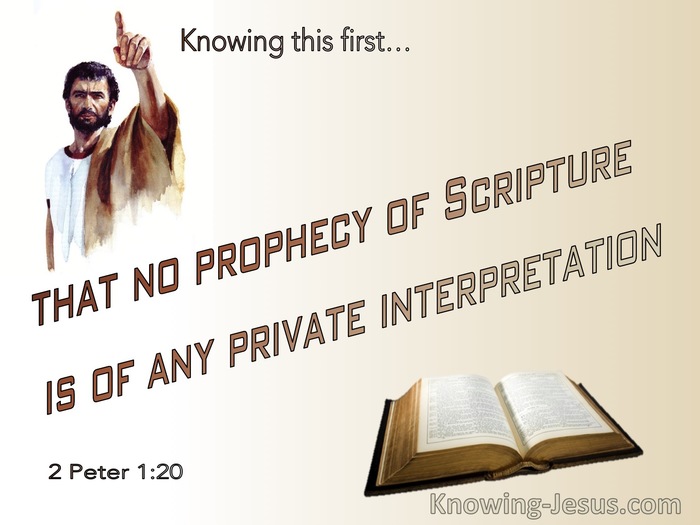◄ What Does 2 Peter 1:20 Mean? ►
But know this first of all, that no prophecy of Scripture is a matter of one's own interpretation,
2 Peter 1:20(NASB)
Verse of the Day
The Word of God is not simply a collection of so many interesting writings from antiquity. God's Word is living and powerful and has been breathed-out from the heart of the living God, to enliven those who trust in His name. Not only was it the Spirit that prompted and inspired holy men of God to script His message to humankind, but He continues to prompt and inspire all who search its pages diligently, with a desire to discover the truth within its pages, and those with an ear that is submitted to the Spirit's leading and guidance.
Peter made it very clear that because of its divine origin, Scripture stands apart from all other writings. He warned that the manipulating, distorting, or private interpretation of Scripture to achieve one's own end is dangerous and very wrong: "But know this first of all," Peter writes, "that no prophecy of Scripture is a matter of one's own interpretation." God's Word is not an accumulation of many books, but one united entity of divine origin. It cannot contradict itself and all difficult sections will be illuminated from other parts of Scripture.
There were those in Peter's day, as there are today, that place visions, dreams, personal experiences, and extra-biblical prophecies on a level with God's Word. There are those who interpret Scripture in light of their own biases and pet doctrines. And there are others who spiritualise passages to say what they want it to say, or what they think it says rather than what it actually says, in its correct context. However, the Bible is its OWN Interpreter and will never contradict itself.
Peter's opponents denied the divine origin of Scripture. They preferred to promote writings from visions, signs, and dreams - as do many today. All extra-biblical writings should be carefully tested to see if they line up with Scripture. Too often, modern-day prophecies and other predictions are a figment of their own imagination and cannot be trusted. However, Peter points out that the apostolic writings of Scripture came from God and not a human author.
Prophecy is not an emotional experience that someone chooses to record for posterity, for personal acclaim, to promote a theory or to gain viewers on a youtube channel. Holy men of God were moved by the Spirit of God. They were generally unaware of the timing of its fulfilment and rarely understood the depth of meaning in their writings. The Holy Spirit is the divine Author of Scripture, and while godly men co-operated, it was the Holy Spirit Who led them in spirit and in truth.
Like all the apostolic writings and prophetic Scripture, Peter reminds us that the Word of God gives illumination, revelation, and inspiration from the Lord. As Paul reminds Timothy: "All Scripture is inspired by God and is profitable for teaching, for reproof, for correction, for training in righteousness." Similarly in Hebrews, we are instructed to rightly divide the Word of God and avoid an incorrect or biased interpretation of Scripture.
Peter identifies the written Word as a light that shines in the darkness, which lightens our journey through this increasingly dark and dangerous world. But he also makes it very clear that no prophetic Scriptures came to be written through the whim or imagination of a writer, and no reader has the authority to interpret any Bible passage according to their own personal impulse or inclination.
Every word is inspired by God and no prophecy stands alone, for the Word of God is its own interpreter, and every passage should be understood, according to its plain meaning, as well as its historic and cultural context. All Scripture ought always to be examined alongside every other Bible passage that bears witness of the same subject.
Although certain Scriptures may hold a special significance for different Christians or speak to an individual on a personal level, no-one has the right to spiritualise Scripture or to insist on their own personal interpretation to promote their own narrow doctrinal dictates. Similarly, the Word of God must never be subjected to multiple interpretations. Indeed, the Bible cannot be correctly interpreted without the Holy Spirit's guidance, although unfortunately there are many that twist and distort it for their own gain, and to the detriment of many in the Body of Christ.
The Word of God outlines the glorious perfection of the holy, triune Godhead, Who created man in His Own image. It furnishes us with an understanding of creation and the fall of man. It scripts the wonders of redemption and the mystery of the incarnation of our Lord and Saviour Jesus Christ. It opens up God's plan of salvation so that whosoever believes on Him will not perish but have everlasting life.
The Word of God also enlightens our understanding of the angelic conflict that has been raging in heavenly places from the beginning of time. It opens our understanding that we are in a spiritual battle, in which wickedness in high places can only be overcome by the blood of Christ. It leads us on a straight path and guides us into right-thinking. It instructs us in holy living, patient endurance, godly loving, and true worship.
The Bible is a direct revelation from God to us, and is unique among all other writings. God communicated His message to man through Scripture, sent His Son to fulfil Scripture, and gave us His Holy Spirit to guide us into all truth. We would do well to take His Word seriously, and study to show ourselves approved unto God, as we examine the Scriptures day by day.
My Prayer
Loving Father, thank You for Your Word, that breathes life and power into my heart. As I read Your Word, I pray that You would lead and guide me into all truth. Teach and train me in right thinking, protect me from error and keep me ever humble in Your sight. In Jesus’ name I pray, AMEN.
Choose a Verse from 2 Peter 1
2 Peter 1:20 Further Study
- 2 Peter 1:20 in the Parallel Bible
- 2 Peter 1:20 in the Thematic Bible
- 2 Peter 1:20 Cross References
- 2 Peter 1:20 Treasury of Scripture Knowing
- 2 Peter 1:20 Sermons
- 2 Peter 1:20 Prayers
- 2 Peter 1:20 Images
- 2 Peter 1:20 Answers
- Choose Chapter
Never miss a post















